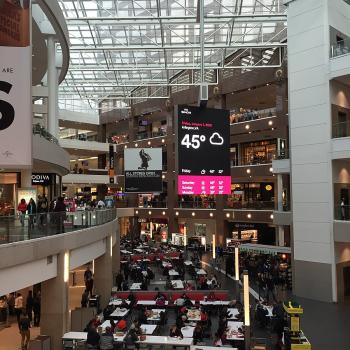In the continuing saga of am I the only person who remembers the ’90s, seriously people, am I going crazy?, let’s look at Hillary Clinton in her historical context:
…The word “superpredator” is part of the long lineage of language used to strip black people of their humanity in order to justify treating them inhumanely. It became popular because it put a clever name to what was already in the air, and this dehumanization has had real, material consequences. It is why black children are seen as inherently guilty, why police officers are more likely to use violent force against black children if they are accused of a crime, why people are more willing to condone police violence if it is against black bodies. It is this stripping of humanity from black bodies, the stripping of childhood from black children, that leads to police officers looking at a 12-year-old with a toy and seeing the threat of an adult “active shooter,” and it is that same dehumanization that saw this as reasonable and allowed those police officers to walk free. …
It is fair to be angry at the Clintons for their actions, but if we attempt to make them our sacrificial scapegoats, we run the risk of underplaying how deeply the roots of mass incarceration run, and how hard we will have to work to rip them out. Because the Clintons, despite their best efforts, did not usher in some new era of the American prison state. The ugly truth of mass incarceration is that it’s not a top-down phenomenon — that is, not primarily governed at the federal level. The instruments of our prison state are more intimate than that. They operate at a local level, at community meetings and town halls, in schools and state legislatures.
In the continuing saga of who will save us from our solutions?, some skepticism about “Fair Chance Hiring” laws aka ban-the-box:
…First, the ordinance does not do anything to benefit the applicant. While it does forbid inquiring about the applicant’s criminal history prior to the employer making a conditional offer, it cannot stop the employer from performing their own criminal history search before extending the offer. Were the employer to extend an offer and rescind it upon seeing an applicant’s criminal history, this would open them to litigation and possible criminal penalties.
Under the ordinance, it would be simpler for the employer not to extend a job offer until the candidate was vetted by the employer through public records searches, giving candidates with any criminal history no chance to explain their case. This is in large part why Goodwill, the only organization appearing before the council that actually works to reintegrate ex-offenders into the economy, testified in opposition of the ordinance.
more (and bonus link which I think shows the urgency of the problem: one judge’s attempt to craft a “certificate of rehabilitation” in a federal system where punishment seems endless)
In the continuing saga of won’t something ever work, though?, two possibilities:
“Detroit to Add Complaints Against Cops to Crime Data“:
The U.S. Attorney’s Office began monitoring the Detroit Police Department in 2003 after it was accused of covering up use of excessive force by cops. Now, as the oversight ends, that information will soon be available to everyone.
Within the next 30 days, the department plans to launch a program that will allow unprecedented public access to department data online, including complaints against officers and police runs to problem areas.
Officers’ names won’t be made public, but the nature of each complaint by precinct will be available.
“Should Hard-Line Prosecutors Be Nervous?”:
Voters delivered two big upsets in local Democratic primaries Tuesday night: in Cook County, Ill. they ousted state’s attorney Anita Alvarez. And in Cuyahoga County, Ohio, incumbent county prosecutor Timothy McGinty lost his re-election bid. Both prosecutors lost in part due to criticism that they failed to hold police accountable for high-profile shootings of young blacks.
The results were especially surprising given that incumbent prosecutors are often a shoo-in in such low-turnout, low-information races.
more (suspect this is your “if you only read one” link)
And last:
Virginia cops and prosecutors in four counties are using a bizarre legal code to secretly blacklist and outright ban residents deemed “habitual drunkards” from purchasing alcohol, a Daily Beast report on a class-action lawsuit filed by the Legal Aid Justice Center claims. The penalties can range from huge fines to jail time.
By prohibiting “habitual drunkards” from buying, consuming, or being near alcohol, the blacklist—which appears to target homeless people—sweeps poor residents, many of them with alcohol problems, off the streets and into jails where no one has to look at them. Cops are reportedly making arrests over the mere scent of booze, without even using a breathalyzer to detect consumption. These “drunkards,” the Daily Beast says, “can’t even go into 7-Eleven without suspicion.”
and charge them for it I know I should link to the original reporting but I wanted you to check out The Influence; so here’s some stuff from a local news report:
…Attorneys say homeless people are not provided an attorney at the initial hearing when they are declared a “habitual drunkard,” and often are not even present at the trial and can’t provide witnesses to help their case.
One of the center’s clients was ruled a habitual alcoholic, and has since been convicted more than 30 times for the past six years for alcohol-related offenses.
“If you look at his criminal record, you know, no violent history anything like that. It’s all about being homeless and being an alcoholic,” said Amy Walters.















